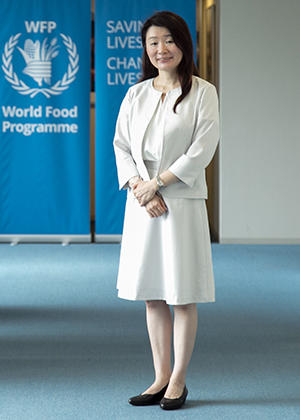Director, UN WFP Japan Relations Office
1996 B.A., Division of International Relations (then), College of Liberal Arts
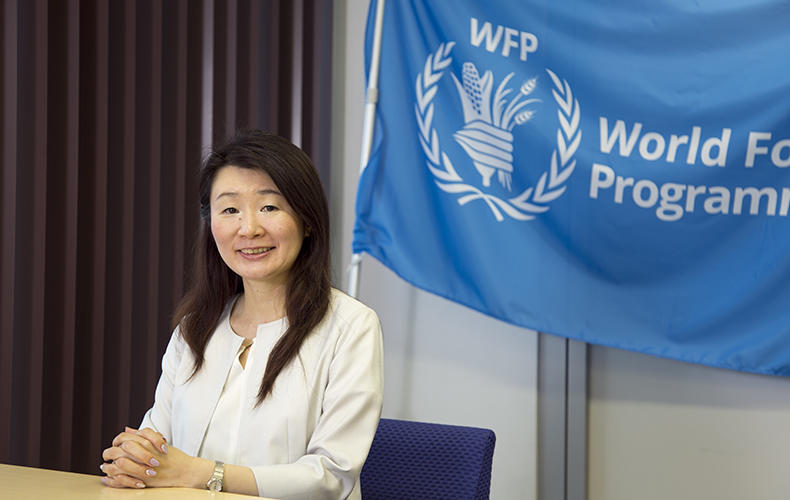
The path until I became Director of UN WFP Japan Relations Office
I have been serving as Director of UN World Food Programme (WFP) Japan Relations Office since June 2017. UN WFP is a UN humanitarian organization working to eliminate hunger from the world. Every year, we provide food assistance to around 80 million people in over 80 countries. Many of our staff work in developing countries at the frontlines of helping people suffering from hunger.
WFP Japan Relations Office engages in fund raising and coordination of assistance from the Japanese government and private sector, building partnership with the Japanese government and private businesses, and public relation activities in Japan. Since our activities are supported by voluntary contributions from governments and the private sector, it is an important part of our jobs to explain the necessity of supporting those in need and report the outcomes of the support we provided in various countries.
After graduating ICU, I studied in the Graduate School of The Australian National University and acquired an MA in international relations. After working for a while in a private company and an NGO, I became engaged in humanitarian assistance work as a UN volunteer in Iraq, Kosovo, and East Timor. While working as a volunteer, I took a test given by the Ministry of Foreign Affairs to take part in the "Junior Professional Officer (JPO) Programme*" and passed the test. I was appointed to UN WFP Headquarters in Rome in 2001 and worked there for three years. In my third year as a JPO, when I was looking for a regular staff position at UN WFP, I found that there was an open position for a Program Officer in Bhutan. I got that job and was assigned to Bhutan as a regular staff member. After that, I was assigned as a donor relations officer at the Japan Relations Office, then worked in Sierra Leone and later Myanmar. I have been in my current position since 2017.
*JPO refers to non-regular professional officers recruited and employed by international organizations under bilateral agreements between the international organizations and donor countries. The main objective of the JPO Programme is to provide young professionals who wish to work in international organizations with the opportunity to gain hands-on experience in the field of multilateral international cooperation to enable them to gain the necessary experience and knowledge to become a professional officer at international organizations.
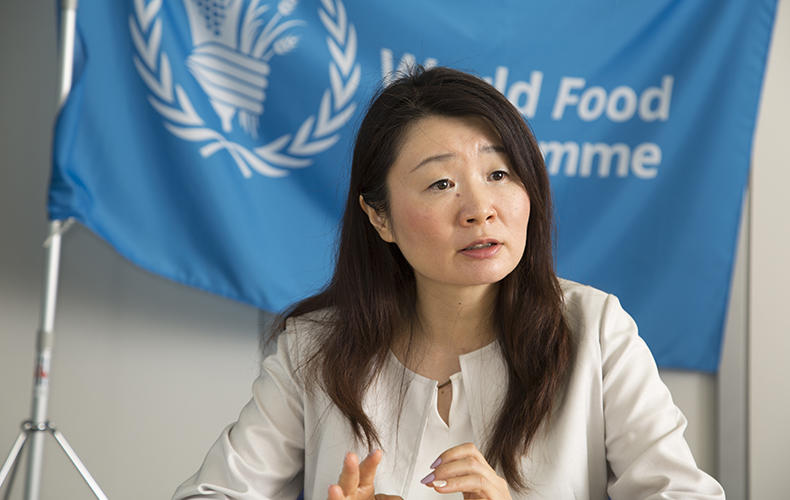
I felt tested through the experience in Sierra Leone
From 2013 to 2015, I led emergency support activities as the Deputy Director and Head of Programme in the Sierra Leone Office in West Africa. Sierra Leone has high malnutrition rates . In addition, the country lacked adequate water and electricity supply to households, so water was being carried by water trucks and electricity supplied using generators. Faced with a big opportunity and responsibility in a country with this kind of situation, I was filled with a sense of mission and nervousness when I arrived in the country.
The year after I arrived, the Ebola outbreak struck, and the country's situation turned extremely serious. Virtually all Japanese citizens were forced to evacuate the country due to an evacuation order issued by the Japanese government. Obviously, not only the Japanese but local staff were equally faced with danger. The ten-year-long Sierra Leone Civil War took the lives of numerous people and exhausted the whole country, but the locals said that "the situation we're facing now is even more terrifying than it was during the Civil War." Everyone was horror-struck by the threat of infection by the invisible and unidentified virus.
Under such situation I felt that I was being tested as a UN staff. "What decisions am I going to make in a crisis like this?" -- I thought that this would become a turning point in my career. Our mission was to provide food assistance in infected areas and at Ebola treatment centers, so there was no denying the risk of infection. I asked myself "Would I regret it if I stayed here and by any chance got infected with Ebola?" My answer was "No." This was in part because I was so moved by the devotion of the local medical staff who were exposed to higher risk of infection than we were, and because I felt a firm sense of unity, that I was a member of the local WFP team. My action was underpinned by the "Leave no one behind" commitment of the Sustainable Development Goals (adopted by the UN in 2015).
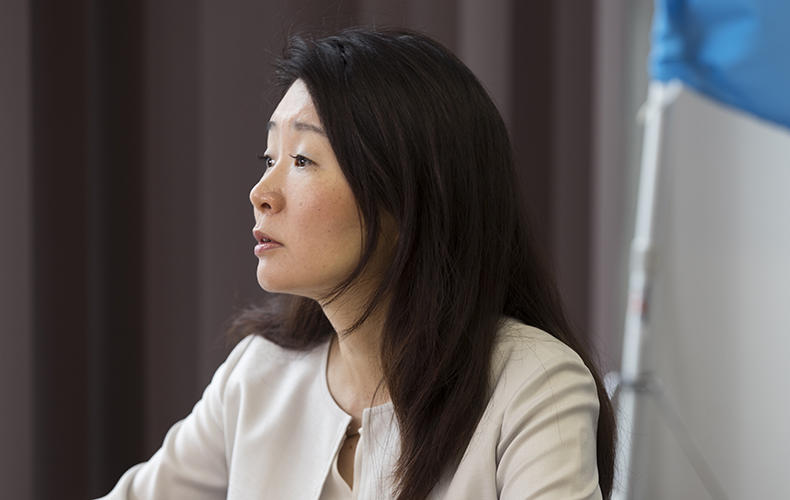
My aspiration to work in the UN changed from a "dream" to a "vision"
Since I was a high-school student, I aspired to work in the UN or other international cooperation organizations. The reason I chose to enter ICU was because I wanted to place myself in an environment where diverse people gathered to acquire an international mindset and perspective.
Many of the faculty members at ICU had experience of working in the UN or other international organizations, so the classes they gave offered profound insights into issues the world faces today such as poverty, population and peace building. I was also able to deepen my understanding of the responsibilities of international organizations. My aspirations to work in the UN and contribute to the international community used to be only a vague longing, but it gradually changed into a distinct vision with a clear-cut profile. I also became very much interested in themes like "human-rights law" and "gender" through presentations and group discussions I experienced in class. Looking back, classes in ICU were well designed to stimulate intellectual curiosity.
I feel that liberal arts education, which is the main feature of ICU education, has been particularly helpful for the work I do now. My job involves determining which area of the world is in need of support by collecting and analyzing various statistical indicators including economic trends. Using these indicators and statistic data as evidence, I must convince many people why support is necessary in the area. This process requires competence in both science and humanities. That I was able to learn regardless of disciplinary borders between science and humanities and that I was trained to think hard until I reach an answer rather than to accumulate knowledge is now a huge asset for me.
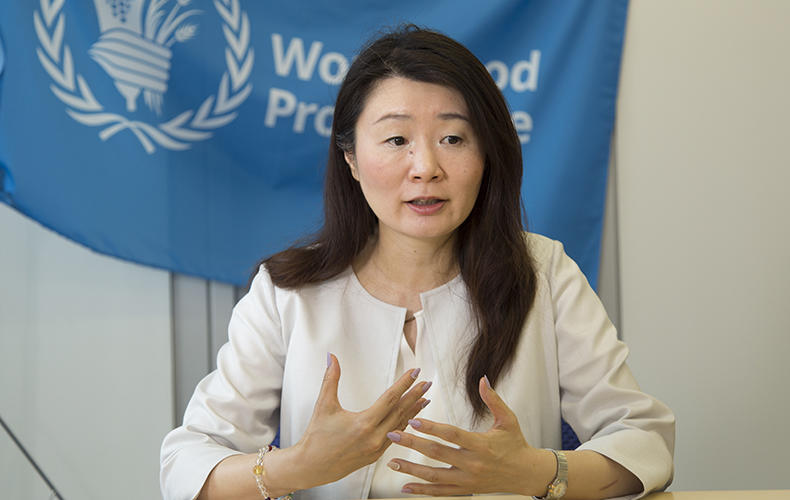
To those who wish to work in the field of international cooperation
I'm sure there are some students studying at ICU who wish to work at the frontlines of multilateral international cooperation. The most important quality, not to mention professional skills and associated qualities, required in people who work at the forefront of this field is the ability to make others feel they want to work with you. In international organizations, including UN WFP, it is common practice to recruit candidates for a position when the position becomes vacant. So usually, only one person is hired at a time. This means that the emphasis will be placed on adaptability, communication skills, and the overall ability as a person.
The word communication skills is often misunderstood as the "ability to fluently express in words what you want to say," but that's not what I mean. The most important part is the "ability to listen to what other people have to say." ICU has an educational culture for developing this kind of ability through dialogue with diverse people from different backgrounds.
People with diverse backgrounds, fields of specialization and career work at UN WFP, from the financial sector to commerce, logistics, ICT, nutrition, statistic research and even airline pilots. I think it's best to try approaching your career starting from what you're good at or what you're interested in. Of course, language ability is important. The official languages used at the UN are the six languages of English, French, Russian, Chinese, Spanish and Arabic. I recommend you be able to speak English and another one from the above six languages.
I think the appeal of working in an international organization is that you can engage in solving global problems. Moreover, it is also a great delight to be able to realize your growth by working together with people of diverse cultural backgrounds and high level of awareness. I hope those of you who aspire to engage with the world and lead a creative career will consider working in the international cooperation sector.
Profile
Naoe Yakiya
Director, UN WFP Japan Relations Office
1996 B.A. in Arts and Sciences (International Relations)
Naoe was born in Hiroshima City. She became a Junior Professional Officer (JPO) in 2001 and was assigned as an External Relations Officer at the UN WFP Headquarters in Rome. After that, she was assigned to Bhutan as a Program Officer and to Sri Lanka as a reports officer. In 2009, she returned to the Japan Relations Office and engaged in fund raising. In 2013 she was appointed as Deputy Director of the Sierra Leone Office and led emergency food assistance activities during the Ebola outbreak. She served as Deputy Country Director of Myanmar Office from 2015 and has held her current position since June 2017.
